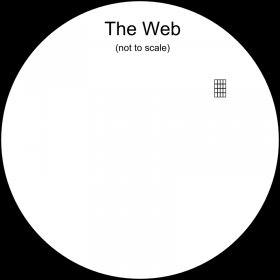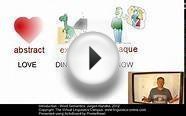Static semantics VS dynamic semantics
 Users don’t read websites the way they read books. They read clusters of pages from many sites that they assemble for themselves or with others they trust; a hunt and gather process that shapes their experience. To help construct a compelling user experience, we content creators need to think outside the box of the website. We need to think about Dynamic Semantic Clusters. One way to do that is with an approach to content design that I call “Every Page is One Page”.
Users don’t read websites the way they read books. They read clusters of pages from many sites that they assemble for themselves or with others they trust; a hunt and gather process that shapes their experience. To help construct a compelling user experience, we content creators need to think outside the box of the website. We need to think about Dynamic Semantic Clusters. One way to do that is with an approach to content design that I call “Every Page is One Page”.
When we think about the user experience of our websites, our biggest mistake may be assuming that it’s our site the user is experiencing. In reality, the user is often experiencing a dynamically assembled cluster of individual pages from many different sites, rendering our carefully crafted site-based user experience moot.
Like most people, my web experience usually begins with Google. My approach is to hold down the Ctrl key and click all the interesting links on the first page of search results, opening each one in a separate tab. I then go through those tabs one by one until I find what I am looking for, or find that I need to do a new search. My user experience, which I have constructed for myself, is not formed by a single site, but by a cluster of single pages from many sites.
This is the kind of behaviour that information foraging theory would lead us to expect. Information foraging, which Jakob Nielsen calls “most important concept to emerge from Human-Computer Interaction research since 1993”, shows that human information seeking behaviour follows the same pattern as the hunting patterns of wild animals. Animals hunt in patches, and must decide when it is better to hunt out the current patch and when it is better to move to a new patch. As Nielsen comments:
If getting to the next patch is easy, predators are better off moving on. No need to deplete all the game in the current patch; once their next morsel becomes a bit difficult to find, they can move to richer hunting grounds. On the other hand, if it’s difficult to move (say, if they have to cross a river), they’re likely to hunt each patch more extensively before going to the next one.
You might also like


|
Word Meaning and Montague Grammar: The Semantics of Verbs and Times in Generative Semantics and in Montague's PTQ (Studies in Linguistics and Philosophy, Vol. 7) Book (D. Reidel Publishing Company)
|



